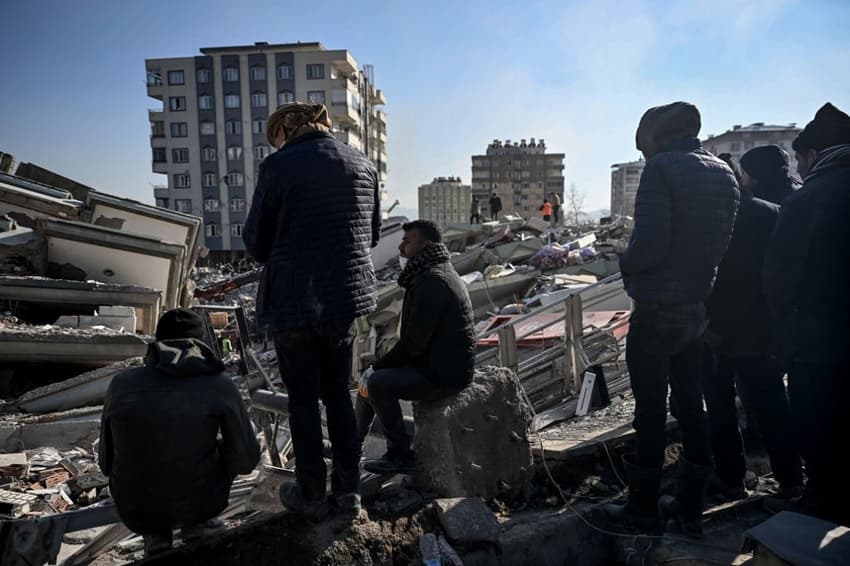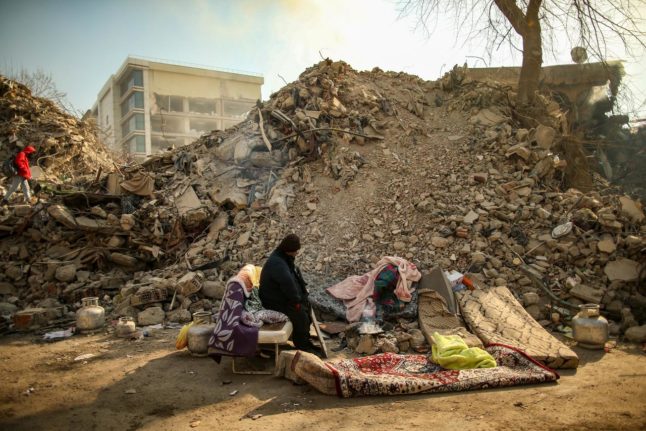How Turkish and Syrian quake victims can come to Germany on an emergency visa

Germany has said it plans to rapidly grant three-month visas to Turkish and Syrian earthquake victims with family in the country. Here's how they can apply.
"As the German government, we want to help ensure that families in Germany can temporarily take in relatives affected by the earthquake if they no longer have a roof over their heads or need medical treatment," said Foreign Minister Annalena Baerbock of the Greens.
The Foreign Ministry formed a task force together with the Interior Ministry, and began its work over the weekend to “quickly issue the visas, valid for three months,” said German Interior Minister Nancy Faeser on Saturday.
The Foreign Ministry has already increased its staff at the missions abroad and reallocated capacities at its visa acceptance centers in Turkey. In northern Syria, which lacks a stable government, the situation is bureaucratically more challenging.
'Emergency aid'
For those receiving the visa, the usual proof of German language skills will be waived. These rapid visas are set to be issued until July 31st, 2023, according to the Foreign Ministry.
"This is emergency aid," Faeser told daily newspaper Bild.
"We want to allow Turkish or Syrian families in Germany to bring their close relatives from the disaster area to their homes without bureaucracy."
As of Monday morning, the deadly earthquake has killed over 34,000 people.
Around 2.9 million people of Turkish origin live in Germany, with more than half holding Turkish nationality.
The Syrian community is also large and is estimated at 924,000 since former German chancellor Angela Merkel opened the borders to refugees in 2015 and 2016. There had been 118,000 Syrians in Germany in 2014.
Many donation centres for earthquake victims have been set up around the country, with many organised by the large Turkish community.
READ ALSO: Turkish community in Germany gathers to help earthquake victims
How do you apply for a visa?
The external service provider iData is responsible for issuing visas in Turkey. Since February 13th, appointments for visa applications have been made at the nationwide branches of the visa acceptance centers.
Visa seekers must prove that their residence is in the earthquake zone and that they have been affected by the earthquake.
A personal interview with the iData is required for this purpose.
Many earthquake victims have lost all their belongings, meaning that many passports lie untraceable under the rubble. In order to be able to help people quickly who have lost their travel documents in the disaster, the Federal Foreign Office is coordinating with Turkish authorities.
"The cooperation of Turkish authorities is essential for the departure of the aforementioned group of people," the Foreign Office wrote.
In other words, applicants must first obtain new documents from Turkish authorities.

A man sits next to a destroyed building in Turkey following the earthquake. Photo: picture alliance/dpa/AP | Emrah Gurel
Who exactly qualifies for an emergency visa?
The relatives must be first or second degree relatives. First-degree relatives are your own parents or children. Second-degree relatives are siblings, grandparents and grandchildren.
Those who bring their relatives to Germany must submit a declaration of commitment.
"With this, the inviting persons undertake to pay for all costs arising in connection with the guest's stay, including the costs of any medical treatment," the website of the German Foreign Office states.
The declaration must be sent to the inviting relative's local immigration authority.
And what do people from Syria do?
For people from Syria, the situation is even more complicated. Applicants from Syria have to turn to the surrounding foreign missions due to the closure of the embassy in Damascus. This means they must travel to the embassy in Beirut, Lebanon, or Amman, Jordan, or visit the consulate general in Istanbul.
Given the catastrophic situation of Syria's infrastructure, this is not an easy task.
Comments
See Also
"As the German government, we want to help ensure that families in Germany can temporarily take in relatives affected by the earthquake if they no longer have a roof over their heads or need medical treatment," said Foreign Minister Annalena Baerbock of the Greens.
The Foreign Ministry formed a task force together with the Interior Ministry, and began its work over the weekend to “quickly issue the visas, valid for three months,” said German Interior Minister Nancy Faeser on Saturday.
The Foreign Ministry has already increased its staff at the missions abroad and reallocated capacities at its visa acceptance centers in Turkey. In northern Syria, which lacks a stable government, the situation is bureaucratically more challenging.
'Emergency aid'
For those receiving the visa, the usual proof of German language skills will be waived. These rapid visas are set to be issued until July 31st, 2023, according to the Foreign Ministry.
"This is emergency aid," Faeser told daily newspaper Bild.
"We want to allow Turkish or Syrian families in Germany to bring their close relatives from the disaster area to their homes without bureaucracy."
As of Monday morning, the deadly earthquake has killed over 34,000 people.
Around 2.9 million people of Turkish origin live in Germany, with more than half holding Turkish nationality.
The Syrian community is also large and is estimated at 924,000 since former German chancellor Angela Merkel opened the borders to refugees in 2015 and 2016. There had been 118,000 Syrians in Germany in 2014.
Many donation centres for earthquake victims have been set up around the country, with many organised by the large Turkish community.
READ ALSO: Turkish community in Germany gathers to help earthquake victims
How do you apply for a visa?
The external service provider iData is responsible for issuing visas in Turkey. Since February 13th, appointments for visa applications have been made at the nationwide branches of the visa acceptance centers.
Visa seekers must prove that their residence is in the earthquake zone and that they have been affected by the earthquake.
A personal interview with the iData is required for this purpose.
Many earthquake victims have lost all their belongings, meaning that many passports lie untraceable under the rubble. In order to be able to help people quickly who have lost their travel documents in the disaster, the Federal Foreign Office is coordinating with Turkish authorities.
"The cooperation of Turkish authorities is essential for the departure of the aforementioned group of people," the Foreign Office wrote.
In other words, applicants must first obtain new documents from Turkish authorities.

Who exactly qualifies for an emergency visa?
The relatives must be first or second degree relatives. First-degree relatives are your own parents or children. Second-degree relatives are siblings, grandparents and grandchildren.
Those who bring their relatives to Germany must submit a declaration of commitment.
"With this, the inviting persons undertake to pay for all costs arising in connection with the guest's stay, including the costs of any medical treatment," the website of the German Foreign Office states.
The declaration must be sent to the inviting relative's local immigration authority.
And what do people from Syria do?
For people from Syria, the situation is even more complicated. Applicants from Syria have to turn to the surrounding foreign missions due to the closure of the embassy in Damascus. This means they must travel to the embassy in Beirut, Lebanon, or Amman, Jordan, or visit the consulate general in Istanbul.
Given the catastrophic situation of Syria's infrastructure, this is not an easy task.
Join the conversation in our comments section below. Share your own views and experience and if you have a question or suggestion for our journalists then email us at [email protected].
Please keep comments civil, constructive and on topic – and make sure to read our terms of use before getting involved.
Please log in here to leave a comment.